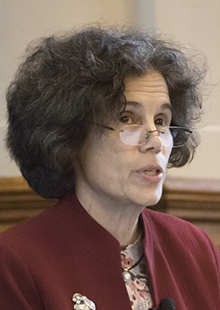
Yale University
Yale Law School professor Judith Resnik on Wednesday received a fellowship from the Carnegie Corporation of New York, to fund her writing and research on prison systems.
In a new book, “The Impermissible in Punishment: Whipping, Isolating, Disenfranchising — and Imprisoning,” Resnik plans to explore the degree to which convicted people live without rights under state authority, and how everyone — including the convicted themselves — can impose limits on unlawful punishments. The Carnegie fellowship, nicknamed the “brainy award,” grants recipients up to $200,000 to conduct research in the humanities and social sciences that addresses the pressing issues in society. This year, the Carnegie Corporation distributed the fellowship to 31 writers and scholars across the country.
Resnik described herself as “honored and delighted” to have received the Carnegie award. Her proposal was selected from a pool of 270 nominations made by universities, think tanks, publishers and nonprofit organizations across the nation. Other proposals recognized this year by the fellowship address issues ranging from the environmental and cultural impact of garbage in Appalachia to inequality in health care from state to state.
In her book, Resnik plans to examine, among other things, transcripts of a trial on the practice of whipping prisoners as discipline in Arkansas in the 1960s.
Resnik’s scholarship is far-reaching. She has explored topics ranging from democracy’s influence on government services to gender and equality. In “Representing Justice,” Resnik and her co-author, Yale Law School Professor Emeritus Dennis Curtis LAW ’66, tell the life story of Lady Justice, examining how the allegorical figure came into being and tracing its appearances in courthouses across the globe.
Resnik is the founding director of Yale’s Arthur Liman Center for Public Interest Law, which sponsors colloquia and seminars on the civil and criminal justice systems and grants fellowships to students at selected institutions.
Founded in 1911, the Carnegie Corporation is America’s oldest grantmaking foundation. Now in its second year, the fellows program claims a distinguished panel of jurors led by former President of the Massachusetts Institute of Technology Susan Hockfield.
Seyla Benhabib — a political science and philosophy professor at Yale who co-edited a book called “Migrations and Mobilities: Citizenship, Borders, and Gender” with Resnik in 2009 — said in an email to the News that Resnik’s recognition by the fellowship program is wonderful news.
“Professor Resnik brings to the study of law terrific insight from the humanities as well as a dedication to effect justice and goodness in the world,” Benhabib wrote. “She now turns her attention to the criminal justice system and I am sure that her work will further encourage the ongoing debate about the reforms that the system needs.”
Kristen Bell, a resident fellow at the Liman Center, said Resnik seeks to structure her research in a way that will make the world a better place for all. Her upcoming book ties in with the topical issue of mass incarcerations and with the research on solitary confinement that the Liman Center has done, Bell added.
Anna Vancleave, director of the Liman Center, said she has no doubt that Resnik’s upcoming book will inspire people to think differently about prisons and punishment.
“Everyone at the Liman Center is ecstatic for Judith, and this award is a fitting tribute to her for all of her contributions,” Vancleave said. “She is a phenomenal teacher and thinker, and her work makes a real impact in the world.”
The Andrew Carnegie Fellowships totaled $6.8 million this year.
Jingyi Cui | jingyi.cui@yale.edu







